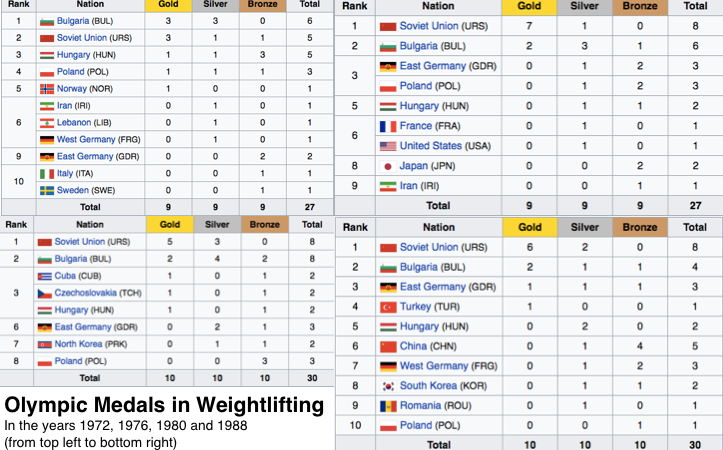
The 3 pillars of the success of the Bulgarian Weightlifting System
The Bulgarian Weightlifting System is known to be the most successful of all time. The man behind the system was the head coach Ivan Abadjiev who won Bulgaria’s first weightlifting medal in 1957 as an active competitor himself. From 1968 to 1989 and again from 1997 to 2000 he was the head coach of the Bulgarian Weightlifting Federation. Abadjiev produced 12 Olympic champions, 57 world champions and 64 European champions. His training philosophy was based around three primary pillars:
1. Specificity – Abadjiev was a big believer of strength being a skill. More specific you train this skill the more specific the adaption will be. I have touched on this in the article „Fitness is specific“ briefly. In detail, for Abadjiev this meant they only did 6 exercises per year:
- Clean & Jerk
- Snatch
- Power Clean
- Power Snatch
- Front Squat
- Back Squat
On the elite level as soon as a certain level of maximal strength indicated by the back squat was achieved he would even eliminate the back squat and only train the front squat as the front squat is more specific to the two competitive lifts – the Clean & Jerk and the Snatch. The Bulgarians would not use any assistance lifts. Their full training volume was dedicated to improving the performance of these 6 lifts with the end goal of maximizing the performance in the two major lifts. Setting world records that are still benchmarks 30 to 40 years later.
2. Frequency – Abadjiev was big believer in a very high training frequency. On the elite level he built up some of his lifters to complete up to 12 workouts a day. The article „How Bulgarian Weightlifters structured their Day of Lifting“ briefly shows an example schedule. Lifting a certain load in a certain pattern is a skill. A skill is primarily trained by repetition. The greater the frequency the greater the repetition volume. This has been applied throughout the sports worlds with a very high success rate like world renowned football club Manchester United who successful applied to have their youth teams play 4 against 4 instead of 7 against 7 to increase player involvement and ball contacts to speed up the development of their youngsters. This principle of frequency is still often forgotten. Especially in the context of weightlifting and strength training increasing frequency for specific time frame while rotating training volume is one of the most reliable ways to get faster results – as the Squat Holiday, the Strength and Mass Holiday and the Training Weekends prove.
3. Competition – Again a skill is specific. Repeat what you want to get better at. You want to become a better competitor then compete more often. Abadjiev would nominate 20 weightlifters to the extended national team. Only 10 weightlifters would be then be on actual national team competing on the international level though. Who gets finally nominated would be indicated by collecting points during extended national team competition on every single weekend of the competitive season which was about 12 weeks and concluded into the major international competition of the year, which were either World Championships or Olympic Games. That means every lifter from the extended national team had to perform at about 12 competitions weekly on the highest level of performance and pressure – stories are there were many lifters in the team that lifted above world record in training – collecting points to then go to the 13th competition to get that medal. Such a competitive environment builds great competitors.
As with any system the Bulgarian Weightlifting System has its downsides. Which where primarily a shortened career of the athlete due to injury and high demand for pressure to endure the monotony and load of the system.
Still during the height of the bulgarian system they where the number one rival of russia going head to head in every major competition. Often beating them. Considering that their were only 5.000 competitive weightlifters in bulgaria compared to 300.00 competitive weightlifters in russia at the time und that there was no technological advantage or superior recovery techniques that only the bulgarians had access to, this is a tremendous feat. A feat to be dissected, analyzed and reproduced.
All the Best applying these 3 pillars in your own training!
Picture: An overview over the Olympic Medals in Weightlifting won at the 1972, 1976, 1980 and 1988 Olympics. The Bulgarians did not compete in 1984 Olympics which the whole Eastern Block boycotted. (source: wikipedia)
